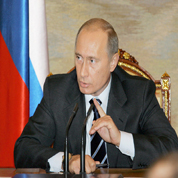De-offshorization of Russian businesses is a right and first step in the right direction

President Putin has announced a set of radical initiatives to crack down on offshore jurisdictions among Russian corporations that still prefer offshsore jurisdictions over local corporate addresses as their holdings’ headquarters.
A common joke among local wealthy business tycoons is that Russia is good only for hosting their production facilities, but not suited for living. This would only have been funny if not for the fact that most entrepreneurs live by this doctrine. They run their Russian businesses via parental companies based in exotic offshores. These firms own everything, or almost everything, in Russia, from retail to energy, power generation to metallurgy, from forestry to auto, aviation industries and several others.
"A common joke among local wealthy business tycoons is that Russia is good only for hosting their production facilities, but not suited for living. This would only have been funny if not for the fact that most entrepreneurs live by this doctrine."
However, their most liquid assets – cash, revenues, profits, shares, etc. – are taken outside Russia. The same is also true of their relatives: children are sent to the best schools that money can buy, wives and girlfriends or husbands are sent to the world’s most expensive resorts. Their kin, if ill, are also sent to the best clinics in the world. It seems most rich Russians do not like anything “Russian” in this country, except its resources.
The billionaires themselves spend millions on acquisitions of foreign real-estate properties, sport clubs and other assets on both sides of the Atlantic and far beyond. The Russian billionaires’ exorbitant life styles and lavish recreational activities, which make Arab sheiks look like a church mouse, and consequently, reportedly jealous, as waiters now prefer them for their record generous tips, have become legendary tales across the globe.
 This is the first paradox of Russian business, because, unlike in other other developed countries, the local elite always prioritizes domestic facilities: local education and healthcare systems for children and sick relatives because they believe they are the best in the world. If such amenities are below the global standards, these elites have through direct sponsorships and indirectly via foundations helped support local community schools, alma-maters, local healthcare centers, township sporting facilities, etc. and raise them to acceptable quality standards.
This is the first paradox of Russian business, because, unlike in other other developed countries, the local elite always prioritizes domestic facilities: local education and healthcare systems for children and sick relatives because they believe they are the best in the world. If such amenities are below the global standards, these elites have through direct sponsorships and indirectly via foundations helped support local community schools, alma-maters, local healthcare centers, township sporting facilities, etc. and raise them to acceptable quality standards.But most Russian business owners today shy away from such philanthropic activities with the agility of people running away from leprous patients in the medieval times. This is despite the fact that most of their multimillion spending sprees are funded from capital generated mostly from Russia’s natural resources. And, since most of their parent companies are based in offshores, most wealthy Russians, according to Kremlin, do not pay their due taxes in this country.
Besides, the few companies that are physically present in Russia, such as luxury residential estates, shopping malls and business centers, also do not pay their due taxes. Thus, according to the Moscow City Government, such firms specially reduce their capitalization values and revenues, so as to minimize or even evade taxes. This is the second paradox of Russian capitalism: the same people that usually burn millions of euros in Alps resorts are at serious pain to pay their due taxes, a fraction of those expenses, into the state coffers.
However, it seems this is all about to stop as the Kremlin finally moves to ensure that only companies registered in the local corporate jurisdiction can have access to the country’s natural resources, participate in the state’s multitrillion-ruble contract tenders, another key source of wealth for the oligarchs. Lack of Russian jurisdiction will also deprive such offshore-based companies the right to the state’s financial resources, such as financial guaranties for securing investments, or cheap loans from the state-owned banking giants, such as Vnesheconombank.
Deplugging such offshore companies from state support will be devastating to their owners, especially under these unstable economic times. Over $110bn or 20% of Russia’s gross export volume were routed via such companies in 2012 alone, while the tally over the past 20 years, according to the government and independent experts’ data, put the estimated amount of capital flight at between $800bn and $1trln.
This brings to mind the fact most Russian corporations, whose beneficiaries are regular features in the Forbes’ wealthiest individuals ratings, were bailed out during the last global economic crisis by the Kremlin, which had to dip very into its petrodollar reserves to stabilize the national economy and key corporate players.
Ironically, most of these companies are based in offshores, and this means that the Kremlin basically spent trillions of rubles saving foreign companies, while the smaller ones based in the country were left out of the bailout fund or received so little that could not prevent them from bankruptcies.
"Over $110bn or 20% of Russia’s gross export volume were routed via such companies in 2012 alone, while the tally over the past 20 years, according to the government and independent experts’ data, put the estimated amount of capital flight at between $800bn and $1trln."
The anti-offshore policy outlined by Putin in a recent National Address are just the beginning of frontal attacks on companies preying on Russia without giving anything in return. “The profits of firms registered in offshores, but belonging to Russians owners, must be taxed under our Taxation Code,” Putin said. “If you want to enjoy state subsidies and financial support while operating in Russia, then you need to register your businesses in the Russian jurisdiction,” the president explained.
Most owners of Russia’s largest companies have said they would be willing to repatriate their assets to Russian jurisdiction if the government comprehensively reforms the local law enforcement system in a way that ensures absolute impartiality and prevents the so-called selective justice. Lack of these basic elements, as well as the insecurity of property ownership rights, have been cited among the reasons for locating businesses offshore.
It seems the situation is now ripe for both the government and businesses to find a workable compromise. With more stringent anti-offshore regulations being put up across the globe, Russian business owners have now probably realized that coming onshore will be more beneficial than hiding in offshores in increasingly hostile international regulations against such practices.
On the other hand, the Kremlin’s measures will not be successful, unless the government takes concrete steps to address the business owners’ justified concerns. This is why this de-offshorization policy, on its face value, is a very good step, but the first of several, in the right direction.












 Web design,
Web design,